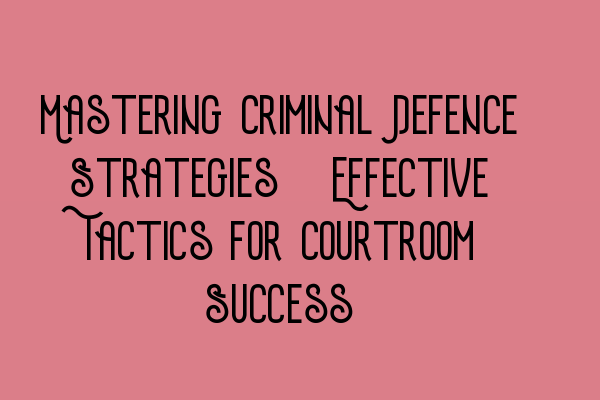Mastering Criminal Defence Strategies: Effective Tactics for Courtroom Success
Welcome to SQE Criminal Law & Practice Law UK, where we strive to provide you with the best resources and knowledge to excel in your legal career. In today’s blog post, we will dive into the world of criminal defence strategies and explore effective tactics that can lead to courtroom success. Whether you are a seasoned lawyer or just starting your journey in criminal law, these strategies will help you master the art of defence.
Understanding the Importance of Criminal Defence Strategies
In the field of criminal law, the stakes are high, and the consequences can be life-altering. A successful defence requires meticulous planning and strategic thinking. Criminal defence strategies are essential to protect the rights and interests of clients, challenge the prosecution’s case, and secure favorable outcomes.
To truly master criminal defence strategies, it is crucial to have a deep understanding of the law, legal precedents, and courtroom dynamics. It is also essential to stay updated with the latest legal developments and constantly refine your skills through continuous learning and practice.
Effective Tactics for Courtroom Success
1. Investigate Thoroughly: One of the key components of a successful defence strategy is thorough investigation. Gathering all the facts, scrutinizing evidence, and identifying potential weak points in the prosecution’s case are vital. A comprehensive investigation helps in building a strong defence and identifying opportunities for cross-examination.
2. Develop Strong Case Theory: A case theory is the backbone of a successful defence strategy. It provides a cohesive narrative that explains the events from the client’s perspective and challenges the prosecution’s version of the story. A well-developed case theory guides the defence team’s actions and helps in presenting a compelling argument in court.
3. Assess Legal Options: It is essential to assess all available legal options and choose the most effective defence strategy based on the circumstances of the case. This may involve exploring plea bargains, challenging evidence admissibility, questioning witness credibility, or presenting alternative theories of the crime.
4. Skillful Cross-Examination: Cross-examination is a powerful tool in the hands of a skilled defence lawyer. By systematically questioning witnesses, the defence can expose inconsistencies, biases, or ulterior motives. Effective cross-examination can weaken the prosecution’s case and create reasonable doubt in the minds of the jury.
5. Jury Selection: Jury selection plays a crucial role in the outcome of a trial. Careful consideration should be given to the characteristics, biases, and attitudes of potential jurors. By selecting a jury that is likely to be receptive to the defence’s arguments, the chances of a favorable verdict can be significantly enhanced.
6. Persuasive Oral Advocacy: Effective oral advocacy is an art that can sway the opinions of judges and juries. Lawyers must hone their public speaking skills, present their arguments convincingly, and adapt their communication style to connect with different individuals in the courtroom. Confidence, clarity, and credibility are key elements of persuasive oral advocacy.
7. Leverage Technology: In the digital age, technology can be a powerful ally in courtroom success. Utilize modern tools for case management, trial preparation, and evidence presentation. Technology can help organize vast amounts of information, create compelling visuals, and enhance the overall efficiency and effectiveness of the defence team.
8. Collaborate with Experts: Collaboration with expert witnesses can provide a significant advantage in criminal trials. Experts in fields such as forensic science, psychology, or accounting can provide specialized knowledge and analysis that supports the defence’s arguments. By leveraging their expertise, the defence can further strengthen their case.
Conclusion
Mastering criminal defence strategies is an ongoing process that requires dedication, knowledge, and continuous improvement. By implementing the tactics outlined above, you can enhance your courtroom success and provide effective representation to your clients. Remember to always stay updated with the latest legal developments and seek opportunities for professional development.
For more resources and preparation courses to excel in the SQE exams, check out our related articles:
- SQE 1 Practice Exam Questions
- SQE 1 Practice Mocks FLK1 FLK2
- SQE 2 Preparation Courses
- SQE 1 Preparation Courses
- SRA SQE Exam Dates
